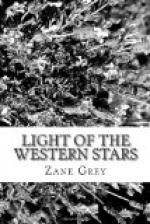Monty, once he had overcome his shyness, became a source of delight to Madeline, and, for that matter, to everybody. Monty had suddenly discovered that he was a success among the ladies. Either he was exalted to heroic heights by this knowledge or he made it appear so. Dorothy had been his undoing, and in justice to her Madeline believed her innocent. Dorothy thought Monty hideous to look at, and, accordingly, if he had been a hero a hundred times and had saved a hundred poor little babies’ lives, he could not have interested her. Monty followed her around, reminding her, she told Madeline, of a little adoring dog one moment and the next of a huge, devouring gorilla.
Nels and Nick stalked at Helen’s heels like grenadiers on duty, and if she as much as dropped her glove they almost came to blows to see who should pick it up.
In a way Castleton was the best feature of the camping party. He was such an absurd-looking little man, and his abilities were at such tremendous odds with what might have been expected of him from his looks. He could ride, tramp, climb, shoot. He liked to help around the camp, and the cowboys could not keep him from it. He had an insatiable desire to do things that were new to him. The cowboys played innumerable tricks upon him, not one of which he ever discovered. He was serious, slow in speech and action, and absolutely imperturbable. If imperturbability could ever be good humor, then he was always good-humored. Presently the cowboys began to understand him, and then to like him. When they liked a man it meant something. Madeline had been sorry more than once to see how little the cowboys chose to speak to Boyd Harvey. With Castleton, however, they actually became friends. They did not know it, and certainly such a thing never occurred to him; all the same, it was a fact. And it grew solely out of the truth that the Englishman was manly in the only way cowboys could have interpreted manliness. When, after innumerable attempts, he succeeded in throwing the diamond-hitch on a pack-horse the cowboys began to respect him. Castleton needed only one more accomplishment to claim their hearts, and he kept trying that—to ride a bucking bronco. One of the cowboys had a bronco that they called Devil. Every day for a week Devil threw the Englishman all over the park, ruined his clothes, bruised him, and finally kicked him. Then the cowboys solicitously tried to make Castleton give up; and this was remarkable enough, for the spectacle of an English lord on a bucking bronco was one that any Westerner would have ridden a thousand miles to see. Whenever Devil threw Castleton the cowboys went into spasms. But Castleton did not know the meaning of the word fail, and there came a day when Devil could not throw him. Then it was a singular sight to see the men line up to shake hands with the cool Englishman. Even Stewart, who had watched from the background, came forward with a warm and pleasant smile on his dark face. When Castleton went to his tent there was much characteristic cowboy talk, and this time vastly different from the former persiflage.




